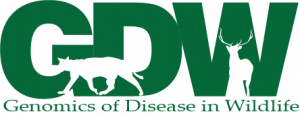GDW2018 Participant Diversity, Expertise and Group Exercise
The GDW2018 workshop selected 20 participants from Norway, United Kingdom, Nepal, Brazil, Colombia, Canada, and Australia and researchers from across the United States.
GDW2018 participants (12 women and 8 men) included four university faculty; four wildlife professionals from nonprofits and federal agencies; two post-doctorates; and ten graduate students completing their PhD or DVM/PhD programs. An additional four auditors (senior graduate students and post-docs) from CSU and University of Wyoming were accepted to the workshop with free tuition. The participants each gave a short overview of their research interests in using genomic tools for wildlife disease during Day 1 & 2 which are presented here: GDW2018 Participant Presentations.
Our group exercise focused on creating analytical workflow from project design to interpreting results to formulate ‘best practices’ for NGS data in wildlife disease. For this exercise, teams of participants each tackled a unique scenario provided by the organizers and applied their knowledge acquired each day of GDW2018 to refine their workflow scheme. On final day of the workshop, these workflows were presented to the group for comments and discussion of the overall exercise.


